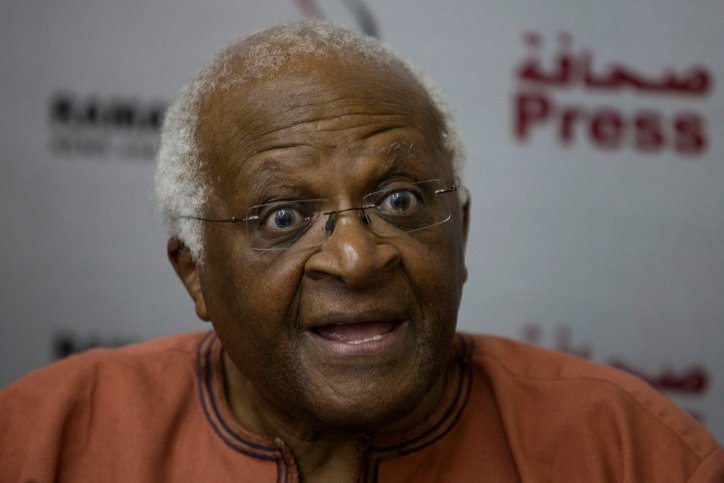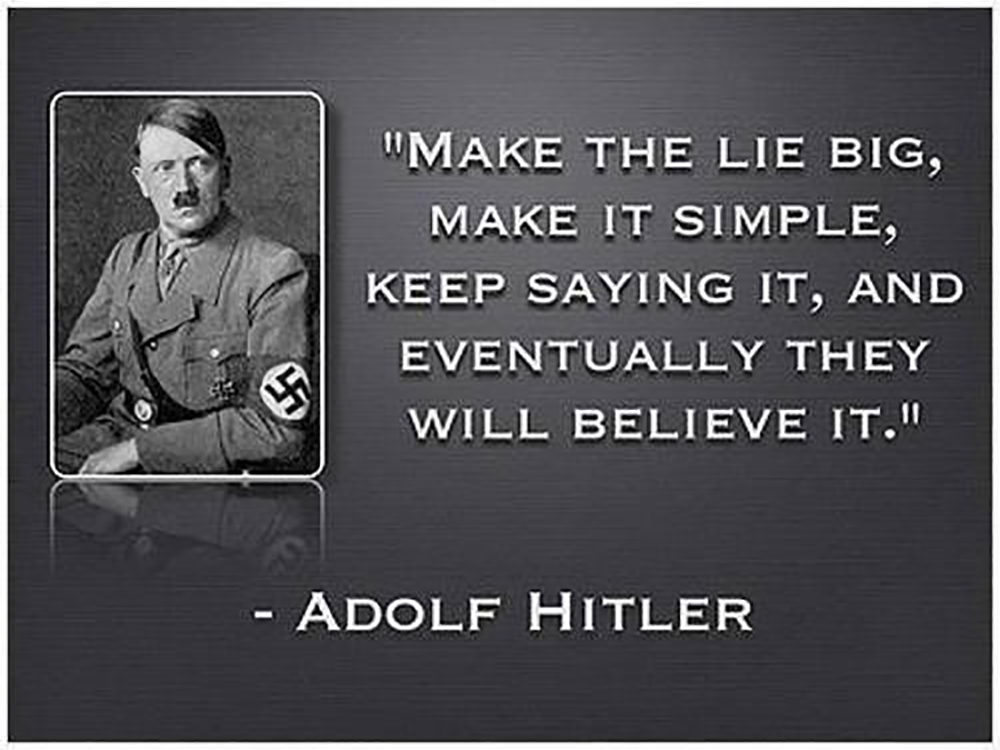A Legacy of Light … And Darkness
 South Africa's Desmond Tutu, Archbishop and Nobel Peace Prize laureate, condemns Israel during a press conference in Gaza City in 2008
South Africa's Desmond Tutu, Archbishop and Nobel Peace Prize laureate, condemns Israel during a press conference in Gaza City in 2008 He was a good man! From presidents to prime ministers to the Queen of England, to academics, activists and journalists everywhere, the accolade-wave for Desmond Tutu appeared unending as it rolled around the world through the final week of 2021.
Understandably. The 90-year-old South African was a former Anglican Archbishop, a national reconciliator and a Nobel Peace laureate. In his life’s multiple roles, his main and most outstanding achievements were the pivotal part he played in bringing down the apartheid system that ravaged his homeland, and in ushering in a new era for his people.
The New South Africa was born without a bloodbath. For this huge gift, Tutu is rightly to be acknowledged.
His legacy, said US President Joe Biden, will “echo throughout the ages.”
Who, then, would want to sully his memory – this man with his infectious smile and diminutive physical stature that is everywhere revered as a moral titan? What gracelessness motivates this article when, at the time of writing, Tutu’s body lies in state in St George’s Cathedral in Cape Town, his mourning “Rainbow Nation” yet to put him in the ground?
It’s not gracelessness or lack of feeling that prompts this from me – a countryman of Tutu’s, a confirmed Anglican and an anti-apartheid journalist.
As a young South African raised by parents who recognised apartheid as evil, Tutu and Nelson Mandela were my heroes. Their readiness to sacrifice their freedom and, if necessary, their lives to resist that racist system influenced me tremendously.
But what drives me now is the loud warning of history; of Church history stretching back to that other colossus of Christendom, the German reformer Martin Luther, and of recent political history that followed the death of Israeli Prime Minister Yitzhak Rabin.
As a Christian, I am immeasurably indebted to Luther, who made the Bible available in the common tongue, wresting God’s Word from absolute Vatican control and thereby, in a very real way, liberating succeeding generations of Christians from the chains of Rome. For Bible-believing Christianity, his impact for good cannot be overstressed.
But, hand-in-hand with this blessing, Luther brought a terrible curse, imbedding into the consciousness of Christendom the – by then already 1500-year-old – hatred of the Jew.
How intolerably tragic, and what a cause for shame, that Luther’s very pre-eminence – the hero-worship of him – served to so effectively fuel the mindset that justified centuries of Christian antisemitism, and that ultimately was used to defend the Holocaust. His teachings, written down in “On the Jews and their Lies,” unquestionably generated the atmosphere in which Hitler’s genocide could be done.
When a famous person dies, political movements will vie to become his heir. And they will move quickly. Exemplary to this is what happened after the assassination of Yitzhak Rabin. While he was outspokenly opposed to the creation of a Palestinian state, the world leaders that congregated in Jerusalem for his unprecedented international funeral made him the patron saint of what became known as the “Two State Solution.” Each year at the anniversary of his death, this fabricated legacy is trumpeted anew.
In Tutu’s case, there is no need to bend the truth about his political stand regarding his country. It was a global cause celebre. The world was united against apartheid and its celebration of his life is its celebration of the champion of the anti-apartheid movement.
In 1984, Tutu was awarded the Nobel Peace Prize, for his efforts “to resolve the problem of apartheid in South Africa.”
This was seen as a gesture of support for him and for the South African Council of Churches which he then headed up. (The Nobel Committee would subsequently show itself as a major motivator of the Two State Solution, in 1994 awarding its peace prize jointly to terrorist chief Yasser Arafat and Israeli leaders Rabin and Shimon Peres.)
Tutu taught the Marxist-Leninist-spawned “social gospel” – a perversion of the Gospel of the Kingdom taught by Jesus. His doctrine, the revolution-endorsing Liberation Theology, was a natural outgrowth of the heresy of Replacement Theology imparted by mainstream Christendom for centuries.
Critical of the Marxist-Leninist governments in the Soviet Union and Eastern Bloc which he hated, he said, “with every fiber of my being,” he nevertheless excused the support of communism by multitudes of South African blacks, arguing that “when you are in a dungeon and a hand is stretched out to free you, you do not ask for the pedigree of the hand owner.”
Precisely that compromising of values would see Mandela betray his incredible legacy as a human rights champion when he embraced the mass Jew-killer Arafat at his presidential inauguration, and aligned the new South Africa with those particularly human-rights-abusing states – Ghaddafi’s Libya and Khomeini’s Iran.
Thus did both of my heroes fall.
The more influential a man is for good, the higher the veneration of him, the greater his responsibility to be careful about other causes behind which he aligns his considerable moral support.
Tutu’s is a life that will be celebrated for decades to come. And with it will be those other causes he championed: “gay rights” and Palestinianism.
After apartheid’s demise, Tutu became “perhaps the world’s most prominent religious leader advocating gay and lesbian rights,” according to his authorised biographer, John Allen. In 2007, he attacked the Anglican Church as being obsessed with the sin of homosexuality and declared: “If God, as they say, is homophobic, I wouldn’t worship that God.” In 2011, he called on the Anglican Church of Southern Africa over which he had presided to assent to same-sex “marriages.”
The other, more long-term delinquency of this anti-apartheid giant, is that he was also an antisemite. He protested this charge while alive, and cannot defend himself now that he is not. But the historical record stands.
It is not that wanting the Palestinian Arabs to live freely is of itself antisemitic.
The evidence is in the propensity to blame Israel for the suffering of the Palestinian Arabs – something which the Jewish nation state neither brought about nor wishes to perpetuate. It was Tutu’s decision (whether out of a readiness to believe accusations against Israel without properly investigating them; out of ignorance fed by antisemitism, or out of an undiluted form of the prejudice fed by Christendom) to wholly embrace the false Palestinian narrative and reject the biblically-, historically- and legally-correct Jewish narrative that gives the lie to his protestations.
Ironically, he chaired the post-apartheid commission whose motto read: “Truth – The Road to Reconciliation.” But when it came to Israel and the Arabs, while he insisted that he was fighting for reconciliation, he eschewed the truth and embraced the falsehood.

Desmond Tutu subscribed to, and perpetuated numerous blood libels – defamations of Israel’s Jews calculated to foment prejudice and justify antipathy towards them. Among them:
- That the West established Israel at the expense of the Palestinian Arabs out of guilty feelings about the Holocaust.
- That Israel’s presence in Judea and Samaria is in breach of international law.
- That Israel had “colonised the West Bank” and “advanced racist laws.”
- That the Jewish state was guilty of “oppressing another people” in order to “guarantee its existence.”
- That “Israeli politicians are aware [that] they can get away with almost anything because the West feels guilty” about the Holocaust.
- That Israel practices “dehumanising policies.”
And, with outrageous presumption and untruth:
- That “our Jewish brothers and sisters [have] forgotten the collective punishment, the home demolitions, in their own history.” That they have “turned their backs on their profound and noble religious traditions [and have] forgotten that God cares deeply about the downtrodden.”
Blood libels are effective because they are believed. This has been evidenced throughout Christian history.
It’s a question as enduring as it is painful: Why would a Christian, who in so many other areas of his life say he seeks to follow the teachings and example of the Christ he worships, nurse – so deep in his heart – a loathing of and prejudice towards the people from whom Jesus came?
The notoriously anti-Israel African-American civil rights activist Jesse Jackson refered to Desmond Tutu as “the Martin Luther King of South Africa.”
Seen against the unhappy backdrop of Christian-Jewish history, the late Archbishop would more accurately be called the Martin Luther of that country.
The legacy of light he brought to South Africa will surely endure. As it does, however, it will also perpetuate his legacy of darkness against Israel and the Jews.
No comments:
Post a Comment